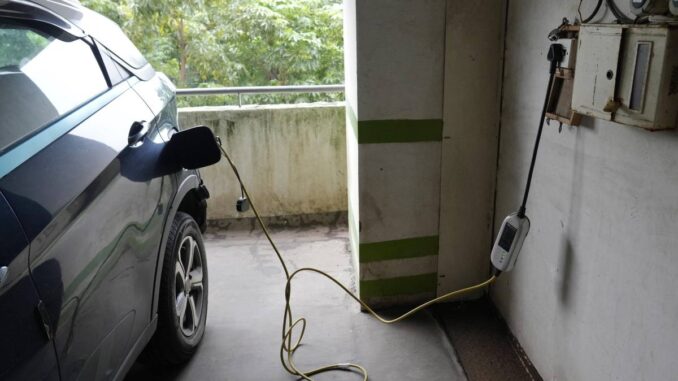
BEIJING — Beijing firmly opposes US tariff hikes on Chinese imports, China’s commerce ministry said in a statement on Saturday, urging the US to immediately correct its “wrongdoings” and lift all tariffs imposed on Chinese goods.
“China will take necessary measures to resolutely defend the interests of Chinese companies,” the statement said.
The Biden administration on Friday locked in steep tariff hikes on Chinese imports to boost protections for strategic industries from China’s state-driven industrial practices.
The US Trade Representative’s (USTR) office said that many of the tariffs, including a 100-percent duty on Chinese electric vehicles (EVs), 50 percent on solar cells and 25 percent on steel, aluminum, EV batteries and key minerals, would take effect on September 27.
The USTR determination, published on Friday and first reported by Reuters, showed that a 50-percent duty on Chinese semiconductors, now including two new categories — silicon wafers and polysilicon used in solar panels — was due to start in 2025.
The action, which marks the end of a more than two-year review of tariffs that had been imposed by former president Donald Trump, mostly left unchanged the top-line duty increases announced in May by President Joe Biden.
These include a new 25-percent tariff on lithium-ion batteries, minerals and components, with those for EVs taking effect on Sept. 27, and those for all other devices on Jan. 1, 2026.
The Biden administration also left in place Trump’s tariffs on over $300 billion worth of Chinese goods ranging from toys and t-shirts to internet routers and industrial machinery at rates of 7.5 percent to 25 percent.
The final decision largely disregarded pleas from automakers for lower tariffs on graphite and critical minerals used in EV battery production because they were still dependent on Chinese supplies.
‘Blunt and ineffective tool’
The action drew industry complaints that the increases would disrupt supply chains, including for semiconductor-intensive products, and do little to stop China’s technology transfer and industry domination practices that have led to excess factory production now flooding global markets.
“Since implementation, the tariffs have cumulatively cost American businesses and consumers $221 billion, while failing to alter Chinese trade policies and practices of concern,” Information Technology Industries Council President Jason Oxman said in a statement.
“With today’s announcement, USTR once again relies on the blunt and ineffective tool of tariffs with no support for their effectiveness.”
Lael Brainard, the top White House economic adviser, told Reuters the decision was made to ensure that the US EV industry diversified away from China’s dominant supply chain.
She said such “tough, targeted” tariffs were needed to counter China’s state-driven subsidies and technology transfer policies that have led to over-investment and excess production capacity.
Washington is investing hundreds of billions of dollars worth of its own tax subsidies to develop domestic EV, solar and semiconductor sectors.
“The 100 percent tariff on electric vehicles here does reflect the very significant unfair cost advantage that Chinese electric vehicles in particular are using to dominate car markets at a breathtaking pace in other parts of the world,” Brainard said.
“That’s not going to take place here under the vice president’s and the president’s leadership.”
A spokesperson for China’s embassy in Washington said the US tariffs would “backfire,” adding that they would also fail to suppress China and solve US industrial problems.
“The 301 tariff is the product of unilateralism and protectionism, and it reflects the hegemonic nature of US power politics,” the spokesman said in a statement.
“China firmly opposes this and will take all necessary measures to safeguard its own rights and interests.”
Tough on China
The higher US tariffs take effect as former US president Donald Trump and Vice President Kamala Harris are both courting voters in auto and steel producing states, trying to position themselves as tough on China ahead of the November presidential election.
Trump has vowed to impose 60 percent tariffs on all Chinese imports.
The European Union and Canada also are imposing new tariffs on Chinese EVs, the latter matching the 100-percent US duties.
The final tariff decision does provide some temporary relief for US port operators who faced a new 25-percent tariff on massive ship-to-shore cranes, an industry that China dominates with no US producers.
The duty would add millions of dollars to the cost of each crane. The USTR said it would allow exclusions from the tariffs for any Chinese port cranes that were ordered prior to the May 14 initial tariff announcements, as long as they are delivered by May 14, 2026.
The USTR raised tariffs to 50 percent on medical face masks and surgical gloves, from an initially proposed 25 percent, but delayed their start to allow a shift to non-Chinese suppliers.
The planned duty on Chinese syringes, which were in short supply during the Covid-19 pandemic, will immediately rise to 100 percent from a previously planned 50 percent, but the USTR will allow a temporary exclusion for enteral syringes, used to feed infants, for a year.
The agency also said it would consider requests for tariff exclusions for five Chinese industrial machinery categories, including those for machinery for purifying or filtering liquids, industrial robots and printing machinery.


Be the first to comment